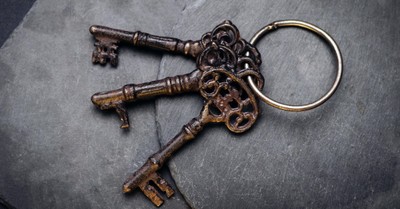Are You Practically Prepared for Death?
-
Paul Dean Dr. Paul J. Dean's Weblog
- Published May 23, 2005
In an ultimate sense, preparing for death has to do with flying to Christ for salvation, because only those who know Christ have life and can look forward to an eternity of joy in Him and in getting to know Him better as eternity rolls on with ever increasing joy in that knowledge of Him. For the Christian, to be absent from the body is to be present with the Lord (2 Cor. 5:8). At the same time, we look forward to a glorious resurrection (1 Corinthians 15). So, preparation for death is knowing Christ, whom to know is life eternal (Jn. 17:3).
A more specific issue has to do with how the Christian can prepare for death in a practical sense. You may remember the report that legendary Hall of Fame baseball player Ted Williams had been placed in cryonic suspension. That means that upon being declared legally dead, Mr. Williams' body was specially treated and cooled to temperatures where physical decay essentially stops, and that he will be maintained in that state until such time as future medical science is able to restore him to good health. Whether or not he was in fact put in cryonic suspension has been a matter of debate. So too has cryonics. Some call it an emerging new technology and one report I read claimed that over one thousand people worldwide had been placed in cryonic suspension.
Without getting into that particular subject, we can say that those who have availed themselves of such were not prepared for death. As we have affirmed, no one apart from Christ is prepared for death in an ultimate sense. But these individuals are not prepared for death in a practical sense either. Again, how can Christians be prepared for death in a practical sense?
First, we can be prepared for death if we admit our frailty to ourselves. In 1Kings 1:1, we read, "Now King David was old, advanced in years; and they put covers on him, but he could not get warm." Two brief points may be observed here. Firstly, Life is such that even mighty men fall. The great King was so advanced in years that he could not even keep warm. We must understand that each one of us will fall in this sense one day. The fact that our bodies are dying and even decaying is part of the curse (Romans 8; 1 Corinthians 15). As a result, all men fall.
As a result of the curse, all men fall in that we fall into sin even if we know God. David committed adultery with Bathsheba and murdered to cover his sin. Often he was plagued with fear, depression, and despair. He had to flee for his life on more than one occasion and his ways were deceptive from time to time. All have sinned and come short of the glory of God (Rom. 3:23).
At the same time, as a result of the curse, we fall into sickness even if we know God. Perhaps the hardships of war combined with the aforementioned fears and depressions served to create a weakness in David in his advanced age such that he could not keep warm. Whatever the case, if the Lord tarries, at least two things are certain. The first thing is that we will eventually lose our earthly health. Despite the wishful thinking of faith healers, medical utopianists, and supporters of cryonics, we will lose our earthly health and die. A knowledge of this fact should not be depressing or morbid. Rather, it should provide us with a knowledge of reality and drive us to a hope in Jesus Christ. For "...I do not want you to be ignorant, brethren, concerning those who have fallen asleep, lest you sorrow as others who have no hope...For the Lord Himself will descend from heaven with a shout, with the voice of an archangel, and with the trumpet of God. And the dead in Christ will rise first. Then we who are alive and remain shall be caught up together with them in the clouds to meet the Lord in the air. And thus we shall always be with the Lord. Therefore comfort one another with these words (1 Thess. 4:13-18)." These words should be comforting.
The second thing that is certain is that we will lose our earthly dignity. In King David's case, because he could not get warm, in accordance with a medical custom of the day, "...his servants said to him, "Let a young woman, a virgin, be sought for our lord the king, and let her stand before the king, and let her care for him; and let her lie in your bosom, that our lord the king may be warm (1 Kings 1:2)." Imagine how the King must have felt at the age of seventy when this young girl was brought in to keep him warm. Surely his kingly and indeed manly dignity and pride took a hit.
But, here we must affirm the sanctity of human life. The sanctify of life is not to be confused with, but to be differentiated from the variety of quality of life arguments advanced in political and/or bio-ethical and medical circles today. Regardless of our notions of dignity, life is precious and must be preserved if possible. It was Hitler who declared mental patients as unworthy of life. He then declared the same with regard to those with birth defects, epilepsy, funny ears, and a variety of other arbitrary blemishes. At least 250,000 people were exterminated prior to World War II in the name of euthanasia. His genocidal culture of death machine was then turned upon Jews, Blacks, Homosexuals and even those Arians with perceived flaws. The parallels in our own nation are staggering to say the least when one considers abortion, partial-birth abortion, extra-uterine abortion, assisted suicide, euthanasia, the removal of feeding tubes from massive numbers of people who have, unlike Terri Schiavo, no brain damage whatsoever.
Quality of life arguments and arguments related to dignity are foisted upon ignorant and unsuspecting families in hospitals every day across the country. The argument goes "because your loved one will have a decreased quality of life and a consequent loss of dignity, why not let him or her go ahead and die in peace?" Oh how we need biblical perspective. In Gen. 9:6 we read, "Whoever sheds man's blood, By man his blood shall be shed; For in the image of God He made man." An attack on the life of a human being, even in the form of removing a feeding tube or assisted suicide is an attack on God, for man bears the image of God.
Christians must understand that losing our earthly dignity is part of the curse. At the same time, we affirm the grace of God. He wants us to go through these things. As Christians, we affirm that through much tribulation and suffering we must enter the Kingdom of God (Acts 14:22). These things are part of our sanctification and God causes all things to work together for our good, even the loss of dignity and the pain of suffering in our last days on this earth (Rom. 8:28). Of course, "...the sufferings of this present time are not worthy to be compared with the glory which shall be revealed in us (Rom. 8:18)."
Referring to the practice of giving ecstasy to patients who are anxious about death, Russell Moore asks by way of paraphrase, "what if the thief on cross had been given ecstasy to relieve his anxiety?" The implication is that humanly speaking, he would not have turned to Christ for salvation and therefore would have died in his sins. It was the suffering, among other things of course, that caused him to contemplate his destiny and turn to Christ for mercy. Who knows the wonders God performs in the hearts of many in their dying days?
Secondly, almost as a side issue, life is such that even mighty kingdoms end. King David's rule came to an end (though theologically his rule typifies the everlasting Kingdom of our Lord Jesus Christ). The theocracy itself passed away with the enthronement of David. He passed away and eventually the monarchy passed away. Kings, presidents, and nations come and go; but the word of our God lasts forever (Isa. 40:8).
Recently, a public school principal told a student during "Me week" that reading the Bible in school was against law. Another student was banned from reading the Bible on the playground during recess. A man in Vermont was denied a personalized license plate that said Jn 3:16. The prevailing trend in this country is freedom from religion, not freedom of religion. As Christians who have been given a cultural mandate and a gospel commission, we must speak to the culture and in the public square. We must seek to influence with all lawful and biblical means. But, in the end, even America will pass away. If we know that, we can be prepared for whatever comes. We don't have to be angry or anxious. Our primary focus must be on Christ, not the Constitution of a by-gone era.
An acknowledgement of these things is simply an admission of our frailty both as individuals and as a nation. But, in Christ, an admission of our frailty is a conscription of strength. Paul wrote, "Therefore I take pleasure in infirmities, in reproaches, in necessities, in persecutions, in distresses for Christ's sake: for when I am weak, then am I strong (2 Cor. 12:10)." Further, consider these words: "So also is the resurrection of the dead. The body is sown in corruption, it is raised in incorruption. It is sown in dishonor, it is raised in glory. It is sown in weakness, it is raised in power. It is sown a natural body, it is raised a spiritual body. There is a natural body, and there is a spiritual body. And so it is written, "The first man Adam became a living being." The last Adam became a life-giving spirit (1 Cor. 15:42-45)." If we know that we are frail here and now, but one day we will be made strong by the resurrection power of Jesus Christ, we will be able to face our dying days with the strength of grace and the grace of strength.
[More Thoughts on this Subject Next Week]


















